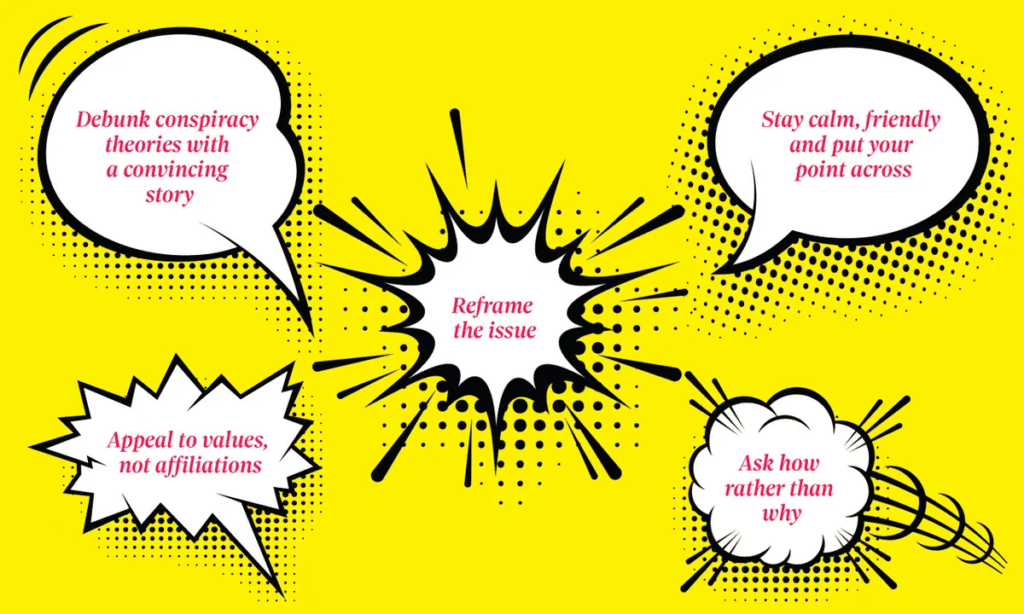Do you know there are certain ways to win any argument that doesn’t involve it deteriorating into a screaming match or a violent outburst?
In this article, we will discuss five ways to win any argument.
In our daily lives, we encounter various situations where we have to argue with others to prove our point. Winning an argument is not just about proving oneself right, but it also helps to build our confidence and make a positive impact on others.
And after conducting extensive and thorough research, our team has screened dozens of methods and carefully selected the five best-applicable ways for winning any argument you encounter.

Let’s look into them without further ado. And while we’re at it, you can also…
SEE: Perfectionism: What It Is, How to Cope With It
Hey! I’m just trying to help.
5 ways to win any argument
The first thing you should know when it comes to winning any argument is …
1. Know your facts and use them effectively
The first and most crucial step in winning an argument is to know your facts.
Do your research and gather information on the topic you are discussing. Use credible sources such as academic journals, books, and reputable websites. Once you have collected enough information, use it effectively to support your argument.
Use examples, statistics, and anecdotes to make your point more persuasive. When using data, make sure to cite the source, which will lend credibility to your argument.
For example, if you are arguing that climate change is real, you can use scientific data to support your argument. You can cite the Intergovernmental Panel on Climate Change (IPCC) reports or scientific studies to show that the earth’s temperature is rising and that human activities are the primary cause.
Related: Easy Ways To Build Confidence
2. Listen to the other person’s point of view
Knowing ways to win any argument does not mean you have to dominate the conversation. It is essential to listen to the other person’s point of view and understand where they are coming from. Active listening will help you identify their concerns and the reasoning behind their argument.
When you listen actively, you can use their points to counter-argue more effectively. It also shows that you respect their opinion, which will help build trust and rapport.
For example, if you are arguing with someone about the merits of capitalism versus socialism, it is essential to understand their point of view. You can listen to their concerns about inequality and poverty and use that information to make your argument more persuasive. You can explain how capitalism can help lift people out of poverty and create economic growth.
Related: 5 Ways To Know You’re Emotionally Intelligent
3. Stay calm and composed
Arguments can often become heated, and it is easy to get carried away by emotions. However, losing your temper can negatively impact your argument and make you seem unreasonable. It is crucial to stay calm and composed during the argument. Take a deep breath and try to control your emotions.
If you feel that the argument is getting too heated, take a break, and come back when you feel more level-headed.
For example, if you are arguing with someone about politics, it is essential to stay calm and not let your emotions take over. You can take a deep breath and try to see the other person’s point of view. You can explain your point of view in a calm and rational manner.
Related: How To Build Professional Development
4. Use logic and reasoning
Logical reasoning is one of the essential ways to win any argument. Use clear, concise statements that are easy to follow. Avoid logical fallacies such as ad hominem attacks, strawman arguments, or false dilemmas. These fallacies can weaken your argument and make you seem less credible.
Instead, use sound reasoning and provide evidence to support your claims.
5. End on a positive note
No matter how heated an argument becomes, it is essential to end on a positive note. Be gracious and thank the other person for their time and effort. If possible, find common ground. This will show that you are open to different perspectives and that you value their opinion.
From a neutral standpoint, using a positive tone in your argument can make it more appealing to listeners. Positive words and phrases can sway opposition in your favor, and this is perhaps the most important of all five ways to win any argument.
Related: 80 Positive Good Morning Quotes to Start your Day
A Final Remark from BattaBox
While winning arguments can provide a sense of satisfaction or validation, it’s important to recognize that the importance of winning an argument is largely dependent on the context and the nature of the argument itself.
In some cases, winning an argument may be crucial, such as in a legal or business setting where the outcome can have significant consequences. In these situations, it’s important to have a solid argument and to present it in a persuasive manner in order to achieve the desired outcome.
However, in many other situations, winning an argument may not be as important as other factors, such as maintaining relationships or finding a mutually beneficial solution. In these cases, it’s often more productive to focus on understanding the other person’s perspective and finding common ground rather than trying to “win” the argument.
It’s also worth noting that a focus on “winning” arguments can sometimes lead to a combative or adversarial communication style, which can be counterproductive in the long run. Building strong relationships and fostering open communication are often more important than winning individual arguments.
Thus ends our lesson on 5 ways to win any argument.
If you have any questions or comments, let us know below.
Read Also:
